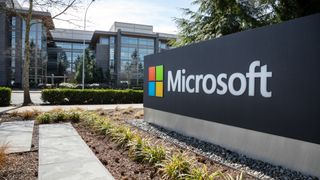Microsoft hints at a "modern OS" for the 5G age
Company details what it wants from new software, although there's no mention of Windows

Microsoft has hinted that it is working on a new generation of operating system designed to support its new range of always-on laptops and PCs, one that could function as an alternative to its current Windows platform.
At its Computex keynote in Tampei this week, the company suggested that this new "Modern OS" would need to be built for "form factor agility" and provide a seemless connection to the cloud across Wifi and LTE 5G.
Interestingly, in a blog post accompanying the keynote, Nick Parker, corporate vice president, consumer and device sales, made no mention of Windows when addressing its features, which could indicate a side step away from Windows.
It seems Microsoft is gearing up for Industry 4.0 as the main takeaways of its vision for operating systems were that PCs should be always connected by 5G, connected to the cloud at all times and powered by AI. He added that any modern operating system should also be secure by default and have a reliable sustained performance at all times, supported by cloud processing when needed.
These new features were described by Parker as "a set of enablers that deliver the foundational experiences customers expect from their devices and includes a set of delighters that deliver innovative human-centric experiences".
"These enablers and delighters underpin our vision for a Modern OS, they will provide the foundational elements for an evolution of the PC ecosystem and enable partners to deliver the more human-centric experiences of tomorrow," he added. "Microsoft is investing to enable these modern OS experiences, and to deliver new ones that take advantage of silicon advancements, powerful PCs, the cloud and power of AI."
Part of Microsoft's "Modern OS" will feature "seamless updates" which will be performed invisibly in the background with no input from the user. The specific vision is arguably a complete u-turn on its approach delivered as part of its latest overhaul of Windows 10 updates, which require greater user intervention with updates that can be deferred by up to 35 days.
Get the ITPro. daily newsletter
Receive our latest news, industry updates, featured resources and more. Sign up today to receive our FREE report on AI cyber crime & security - newly updated for 2024.
The desire to create something with "form factor agility" suggests the OS will be available on many different types of devices, which adds to speculation that the company will be expanding its Surface range to include a smartphone.
With 5G now live in the UK as of today, it's only going to get better and offer wider coverage as time goes on. Prices for contracts are high at the moment but Microsoft sees PCs utilising 5G, so much so that operating systems will be designed with the new technology in mind.
With a connection at all times, cloud connectivity will become more achievable which will enhance user experiences on their devices thanks to leveraging cloud resources, according to the company.
Multi-sense interaction options also comprise the company's vision for the future of operating systems, saying that pens, voice touch and even a gaze will be just as functional as a keyboard and mouse
"The opportunities we all have to empower people, drive growth and enable business transformation, when we use the power of the cloud and AI to build intelligent edge solutions, are limitless," said Parker. "I look forward to the innovation we will deliver together."

Connor Jones has been at the forefront of global cyber security news coverage for the past few years, breaking developments on major stories such as LockBit’s ransomware attack on Royal Mail International, and many others. He has also made sporadic appearances on the ITPro Podcast discussing topics from home desk setups all the way to hacking systems using prosthetic limbs. He has a master’s degree in Magazine Journalism from the University of Sheffield, and has previously written for the likes of Red Bull Esports and UNILAD tech during his career that started in 2015.




